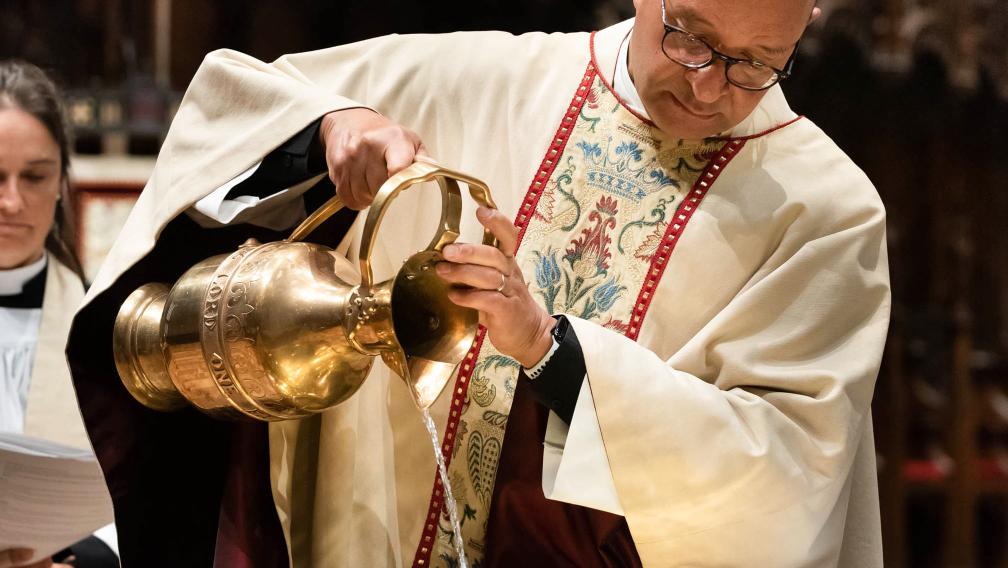Five Ways Into Sunday’s Scripture: The Cliffhanger of Epiphany

Here is my servant, whom I uphold, my chosen, in whom my soul delights; I have put my spirit upon him; he will bring forth justice to the nations.
He will not cry out or lift up his voice or make it heard in the street;
a bruised reed he will not break, and a dimly burning wick he will not quench; he will faithfully bring forth justice.
He will not grow faint or be crushed until he has established justice in the earth, and the coastlands wait for his teaching.
Thus says God, the Lord, who created the heavens and stretched them out, who spread out the earth and what comes from it, who gives breath to the people upon it and spirit to those who walk in it:
I am the Lord; I have called you in righteousness; I have taken you by the hand and kept you; I have given you as a covenant to the people, a light to the nations,
to open the eyes that are blind, to bring out the prisoners from the dungeon, from the prison those who sit in darkness.
I am the Lord; that is my name; my glory I give to no other, nor my praise to idols.
See, the former things have come to pass, and new things I now declare; before they spring forth, I tell you of them.
Isaiah 42:1–9
And a voice from the heavens said, “This is my Son, the Beloved, with whom I am well pleased.”
Matthew 3:17
After the many, somewhat lugubrious, prophecies we read in Advent, we are gifted with and lifted by one of Isaiah’s most lovely and poetic descriptions of God’s incarnate Messiah, who, at the time, was thought to be Cyrus the Great. The identity of another servant Messiah, 700+ years later, is confirmed in the last line of Matthew’s brief gospel narrative on Jesus’s baptism.
Within Isaiah’s imagery lies a blueprint for all of God’s beloveds: to serve God and one another gently, fully, and deeply, rather than with harsh judgement and punishment. We are not only beneficiaries but the progeny of anyone who serves the God of creation with justice and freedom.
But what are we to make of the contrasts between Isaiah’s portrayal of God’s mission through Cyrus and the monarchical language of the raw dominance of the “Lord” in this Sunday’s Psalm 29, written around 300 years prior? Do we see an evolution here? Or is it implied that human saviors were idealized and written in our image?
Who is this Jesus, anyway? With which Judeo-Christian identity do we reflect and make covenant? Who exactly will be revealed, or glorified, in our time? This is the cyclical cliffhanger that we approach during the Season after the Epiphany.
Stay tuned!
—Kathryn Carroll
THEOLOGY
Not just for preachers, these anecdotes and biblical factoids from David Roseberry open some interesting connections around Jesus’s baptism.
SOCIAL JUSTICE
Trevor Williams writes, “Jesus is seeing baptism as a commitment of solidarity with God and neighbour rather than a mechanism to deal with ‘sin.’”
SHORT FILM
The human ritual of baptism can bond us with a past and present “cloud of witnesses,” as well as with those who seek God in other ways and places.
MUSIC
The Choir of Trinity Wall Street sings Stacey V. Gibbs’s powerful arrangement of Wade in the Water.
POETRY
“Beginning with Beloved” by Jan Richardson.
Coming Soon
Sundays, January 8–29 | 10am
Discovery: God, Love, Eros, and Incarnation
The Song of Songs gives a blueprint for love and companionship. See how poets and artists and the writer’s contemporaries explored relationships in this Scripture. This week, join Nate Wall, Scholar-in-Residence at Church of the Redeemer, Toronto, for Hide and Seek: Reading the Song of Songs with Poets.
Thursdays, January 19–April 13 | 6–8pm
Into the Word
Do you have questions about the Bible? How can today’s reader make sense of these ancient texts, and what does it take to interpret Scriptures responsibly? Join Trinity’s Faith Formation & Education team for an evening discussion series that goes beyond ordinary Bible study. We’ll explore your questions about the Bible and think together about what Scripture has to do with our beliefs, our traditions, and our personal lives.





